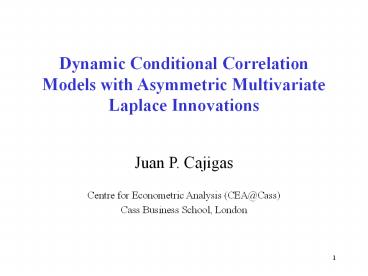Dynamic Conditional Correlation Models with Asymmetric Multivariate Laplace Innovations
Title:
Dynamic Conditional Correlation Models with Asymmetric Multivariate Laplace Innovations
Description:
Normality-MLE/QMLE = feasible consistent but inefficient DCC coefficients ... Much higher kurtosis when. the AML distribution is used. ... –
Number of Views:108
Avg rating:3.0/5.0
Title: Dynamic Conditional Correlation Models with Asymmetric Multivariate Laplace Innovations
1
Dynamic Conditional Correlation Models with
Asymmetric Multivariate Laplace Innovations
- Juan P. Cajigas
- Centre for Econometric Analysis (CEA_at_Cass)
- Cass Business School, London
2
Dynamic Conditional Correlation (S,L)Engle
(2002), Engle and Sheppard (2001)
3
Implications of the assumption of normality
- Normality-MLE/QMLE feasible consistent but
inefficient DCC coefficients (Bollerslev and
Wooldridge, 1992) - Normality is not a satisfactory property for
financial time series. - Non normal distribution to achieve efficiency
with implication for the first stage - Importance of efficiency for
- Portfolio allocation
- VaR Analysis (Risk)
4
The main contribution of this paper(AML)-ADDCC
(1,1)
- We propose an AGDCC (1,1) model and its nested
versions using the Asymmetric Multivariate
Laplace (AML) distribution for the vector of
standardized residuals. - This is a special case of the Geometric Stable
law (Kotz, Kozubowski and Podgorski, 2003) - It preserves convolution properties
- It has finite variance,
- It has a closed-form,
- It allows for leptokurtosis and asymmetries.
5
The AML distribution (...continue)
- Geometric Stable Distributions
6
The AML distribution (...continue) NO
- If we have that,
- then
7
The AML distribution (...continue)
- Main properties
- Tail behavior governed by the index of stability.
For the AML distribution - Density function
- where v (2 - n)/2 and Kv(u) is the modified
Bessel function of the third kind
8
The AML distribution
- Mixtures of normal distributions representation
- where YN(0,H), Zexp(1) and XAML(m,H).
Therefore,
9
AML distribution
10
Two-Step estimation feasible (1)
- Normal case (Engle, 2002 Engle and Sheppard,
2001)
11
Two-Step estimation feasible (2)
- Normal case
- Engle (2002) uses Newey-McFadden (1994, HoE)
results on GMM to justify the use of MLE for
consistency
12
AML Two-Step estimation feasible
- FIRST STEP Conditional variances
13
AML Two-Step estimation feasible
- SECOND STEP Conditional correlations
14
AML Two-Step estimation feasible
- For n 2s 3, s 0,1, the Bessel function has
a closed form that transforms the density
function to
15
AML Two-Step estimation feasible
- In this case we have
16
Empirical applications (1)Modelling using DCC
models
- Data as in Cappiello, Engle and Sheppard (2004)
- a) FTSE All-World weekly indices converted to US
denominated returns for 21 countries and - b) Bond indices of 12 constructed by Datastream.
- Sample Period 08/01/1987 - 07/02/2001
17
Main findings from the empirical application
using stocks/bonds
- Significant differences with Cappiello et al
(2004) in the asymmetric models (AGDCC and ADCC) - Asymmetric terms much smaller when the AML
distribution is used instead of the normal - Log-likelihood does not increase with the
inclusion of asymmetries when the AML
distribution is used
18
Main findings from the empirical application
- Distribution of conditional correlations
- Much higher kurtosis when the AML distribution
is used. - The impact of this feature could be relevant
for VaR applications































